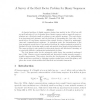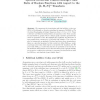107
click to vote
SETA
2004
Springer
15 years 7 months ago
2004
Springer
Abstract. Merit factor of a binary sequence is reviewed, and constructions are described that appear to satisfy an asymptotic merit factor of 6.3421 . . . Multivariate merit factor...
130
click to vote
SETA
2004
Springer
15 years 7 months ago
2004
Springer
We study algebraic feedback shift registers (AFSRs) based on quotients of polynomial rings in several variables over a finite field. These registers are natural generalizations o...
101
click to vote
SETA
2004
Springer
15 years 7 months ago
2004
Springer
A classical problem of digital sequence design, first studied in the 1950s but still not well understood, is to determine those binary sequences whose aperiodic autocorrelations ...
116
click to vote
SETA
2004
Springer
15 years 7 months ago
2004
Springer
In order to reduce key sizes and bandwidth, cryptographic systems have been proposed using minimal polynomials to represent finite field elements. These systems are essentially e...
141
click to vote
SETA
2004
Springer
15 years 7 months ago
2004
Springer
We enumerate the inequivalent self-dual additive codes over GF(4) of blocklength n, thereby extending the sequence A090899 in The On-Line Encyclopedia of Integer Sequences from n =...


